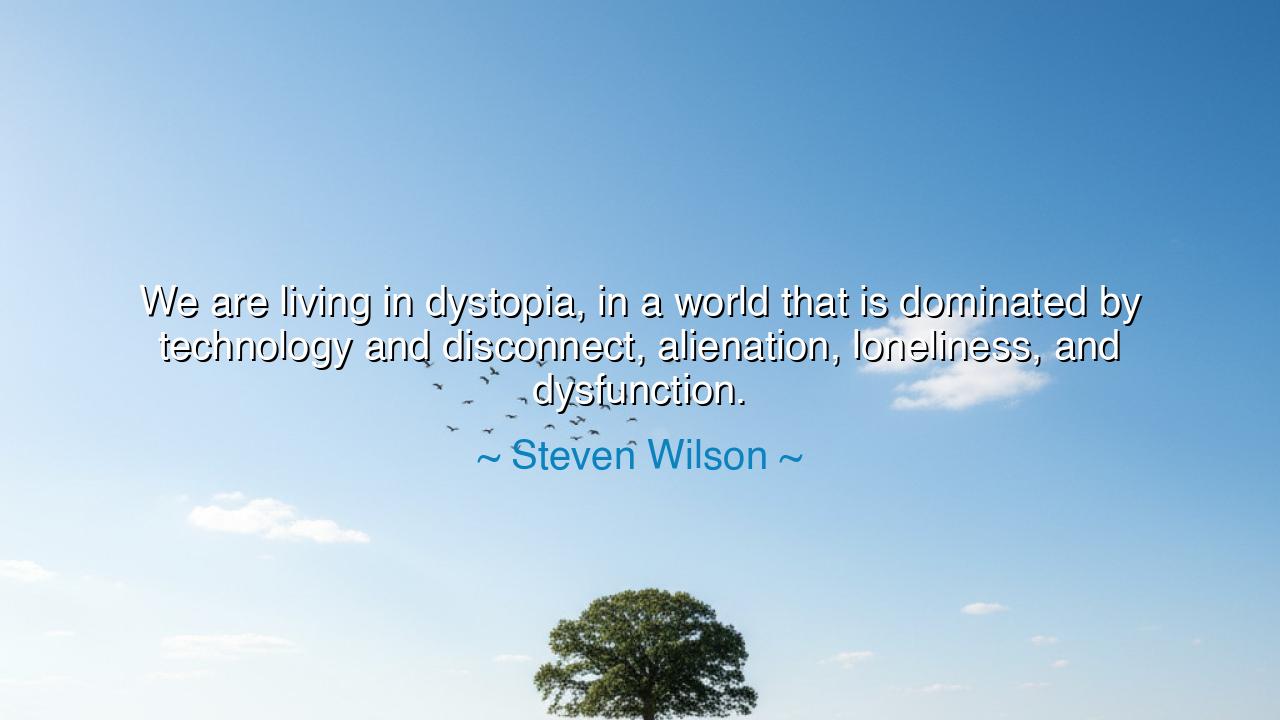
We are living in dystopia, in a world that is dominated by
We are living in dystopia, in a world that is dominated by technology and disconnect, alienation, loneliness, and dysfunction.






Hear the lament of Steven Wilson, a voice that cuts through the silence of our modern age: “We are living in dystopia, in a world that is dominated by technology and disconnect, alienation, loneliness, and dysfunction.” These words are not a mere complaint, but a warning, a mirror held up to our time. For though we wield powers once reserved for gods—machines that speak, wires that carry our voices across oceans, devices that put the world at our fingertips—we find ourselves strangely impoverished in spirit.
In the ancient days, the hearth was the center of life. Families gathered around fire, tribes around the storyteller, villages around the well. To live was to belong, to share not only bread but presence. But now, the hearth has grown cold, replaced by glowing screens that promise connection yet deliver solitude. Technology, once a tool to bind us, has become a master that isolates us. We speak endlessly, yet hear so little; we scroll endlessly, yet touch so few hearts. This is the dystopia Wilson names—a world where abundance breeds emptiness.
Consider the story of the industrial age. When machines first roared to life, they promised freedom from toil. Yet they also tore men and women from the fields and placed them in crowded cities, where smoke blackened the skies and souls grew weary. Workers lived side by side, yet were alienated from one another, bound to machines instead of to kinship. The pattern repeats in our time: we created digital marvels to free us, yet many find themselves enslaved by them—enslaved by the endless chase of attention, the hunger for approval, the quiet gnawing of loneliness.
But take heart, for Wilson’s lament is also a call to awakening. To name a dystopia is to resist it, to recognize that it need not be our fate. The disease is real—alienation, disconnect, dysfunction—but so too is the cure. For the cure lies not in abandoning technology, but in mastering it, in using it as servant and not as master. Like fire, it can warm or destroy; like water, it can nourish or drown. The power lies in our hands, if only we awaken.
Let us ask: what does it mean to live fully in an age of wires and screens? It means reclaiming presence. To look into another’s eyes without the mediation of glass. To speak with a living voice, not only with a typed word. To choose moments of silence, free from the constant hum of devices, so that the soul may breathe. To gather again in circles of community, whether around tables, in gardens, or in places of worship, where no screen intrudes upon the sanctity of human connection.
The lesson is this: do not be lulled into forgetting what it means to be human. Resist the tide of dysfunction by cultivating relationships rooted in reality, not in illusion. Resist loneliness by reaching out, even when it feels awkward or difficult. Resist alienation by practicing empathy, by daring to hear and to be heard beyond the shallow currents of digital chatter. Technology may shape the age, but it must not shape the soul.
Practical steps follow: set aside times each day to be fully present with those around you, without distraction. Walk in nature, where no algorithm governs the beauty of wind and tree. Speak honestly and deeply with a friend, rather than scattering fragments of yourself across a thousand strangers. Use technology consciously—create with it, learn with it, but do not let it hollow you with endless consumption. In this way, you reclaim the throne of your own humanity.
Thus, remember the cry of Steven Wilson: “We are living in dystopia...” Yet a dystopia named is a dystopia that can be overcome. The task lies with us—to lift our eyes from the glowing screen, to clasp the hand of another, and to choose presence over absence, love over loneliness, and humanity over hollow progress. For only then can the age of technology become not a prison, but a path to deeper life.






AAdministratorAdministrator
Welcome, honored guests. Please leave a comment, we will respond soon